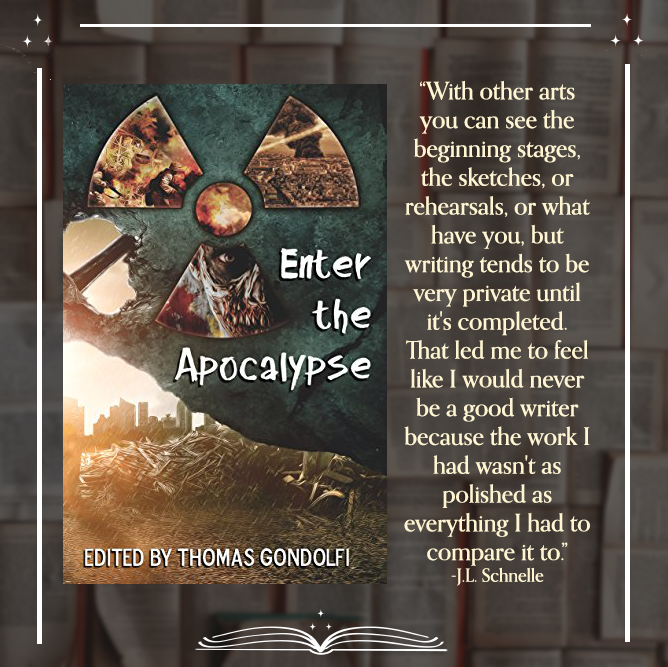
We spoke with JL Schnelle about her horror story, [An Acceptable Loss], which was published in Enter the Apocalypse by TANSTAAFL Press. We discussed her experience with short stories, her writing practices, and her toolkit for dealing with writer’s block. —Katsumi Sterling
If you could go back in time and tell your struggling, aspiring younger self one thing, what would it be?
I think I’d have to tell them that first drafts don’t have to be perfect. Finding out how powerful editing can be would have made a huge difference to me; knowing that it can fix everything from tone to pacing would have really helped my confidence. With other arts you can see the beginning stages, the sketches, or rehearsals, or what have you, but writing tends to be very private until it’s completed. That led me to feel like I would never be a good writer because the work I had wasn’t as polished as everything I had to compare it to. There are so many stories I threw in the trash because I wasn’t aware of how much work went into a finished product, and I regret the stories I lost that way. So I guess that’s another piece of advice; never delete a story, because someday you might miss it.
What is your favorite or go-to piece of advice for someone who is preparing a novel or short story for submission?
Read all of the instructions! I have never seen a submission setup that wasn’t extremely detailed in what they expect for format, and ignoring that can get your story thrown out without ever being looked at. It’s good to assume Arial font and a .doc save file, but always double check before you send.
Are there any specific tools/processes you can’t live without, and how long have you been using them?
I have a couple of processes I depend on, actually, and at least one of them is pretty silly. The worst struggle I have is getting over the middle bits of stories, when everything needs to keep moving at a medium—but steady—clip. Because of this, I’ve found three distinct ways of making plot elements click in my head when I get stuck. The first is to shower; standing (or sitting) in the shower, just letting my brain work on automatic.That’s saved me more times than I can count. The second is to go driving with someone, with myself as the passenger, music turned up loud. I stare out the window and let myself sink into the world I’m creating; from there I can usually see what’s holding me up. Last is to get tired. Writing tired has given me some of my best work, because I have less energy to spend getting in my own way. That’s my most powerful tool as well. If I have a difficult scene ahead I don’t let myself write until after midnight.
What was the best piece of writing advice you’ve ever received?
There’s an Alan Moore quote that gets used around my house a lot: “If you write, you’re a writer.” My family says it to me when I get too much in my own head, and start doing more self-hating than writing. It doesn’t sound like the usual “write every day!” advice, but that’s why it works for me. With depression and anxiety and a whole host of physical health issues, I can’t do most of the things that are passed around as conventional writing advice. What I can do, though, is remember that I write, so I am a writer, and that that’s enough. It keeps me from getting caught in a self-defeating cycle where I don’t create at all, and that makes it the most powerful piece of advice I’ve ever heard.
What is your favorite page-turner?
Oh boy, I can’t think of a way to narrow it down or how to answer this in a way that isn’t long-winded! Alright, so, in the ‘70s and ‘80s V.C. Andrews wrote five books, then sadly passed away. Since then, books have been written under her name by a ghost writer, which are passable, but those first five books are some of the most compelling writing I have ever read. They are not, strictly speaking, good, at least in a writing conventional sense. They are, however, impossible for me to put down. I have read all five of them over a dozen times each, and no matter how many times I read them I am compelled to finish them, trapped in a speeding car with Andrews as she drives me wildly towards a finish that I know will always be disastrous but that I can’t help enjoy.
My favorite one is called Heaven.
Check out J.L.’s short fiction, [An Acceptable Loss], in Enter the Apocalypse on Amazon.
Author Bio
Schnelle is a queer, disabled author of horror and speculative sci-fi. She lives in a beautiful, stark desert landscape, and her writings tend to reflect that background.
Twitter: @jl_schnelle
Patreon: JacalynSchnelle


